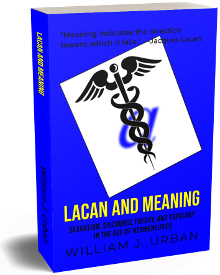LACAN AND MEANING
SEXUATION, DISCOURSE THEORY, AND TOPOLOGY IN THE AGE OF HERMENEUTICS
CHAPTER 1
PETITIONS TO MEANING
— page 28 —
demystify false consciousness. But according to Ricoeur, such meaning could also be recollected through the being disclosed by the hermeneutical circle of understanding. Indeed these form the two poles of his project which aims to resolve their tension with a general hermeneutics. Yet his position remains ambiguous. Given the stated intentionality of meaning, his defense of Kantian transcendental logic, and his overall effort to ground the two poles in a concrete reflection not unlike what the Habermasian subject achieves, Ricoeur presents a classical stance. Then again, his book concludes with favorable discussions of faith, the sacred, and the spoken word as revelatory of kerygma, which suggest instead an embrace of hermeneutical phenomenology.
This ambiguity is not easily cleared up. Projects aiming to resolve the debates tend to remain vague on where loyalties ultimately lie. But only officially, for the very effort to resolve is at once an implicit acknowledgment of the gap separating the two sides. Typically then, a close reading reveals one of two mutually exclusive strategies. Either this gap is deemed as always already overcome à la Gadamer, or else it is somehow productively maintained. Ricoeur’s later work undertakes the latter strategy. Doing so places him at odds with the above four men who all feel a categorical dismissal of the former strategy amounts to a satisfactory resolution. In contrast, Ricoeur subjects hermeneutics once again to the alienating distance of the other presupposed by methodological abstraction, while simultaneously acknowledging the logical priority of hermeneutical phenomenology. This priority is reasonable enough. No longer a mode of knowing but a way of being, Heidegger’s understanding addresses a field of meaning beyond the reach of traditional methods. As a result, any subject exclusively appealing to objectified (or objectivated) meanings necessarily misses the primordial meaning of the entire interpretive venture. It is therefore not surprising that once Gadamer spread the word of the high cost of remaining in a pre-Heideggerian state, hermeneutical phenomenology quickly came to prominence.
However, this does not fully warrant dispensing with methodology. Of course, hermeneutical phenomenology officially casts aside the subject-object schema. But the fact remains that even its most ardent supporters enthusiastically discuss the schema, long after and far beyond what Heidegger originally deemed necessary to establish the historical succession of his philosophy. This might be read as vigilance, in recognition of the difficulty of surmounting our spontaneous understanding of the world where meaningful objects appear ‘over there.’ Yet it could also be that the meaning of primordial understanding is only disclosed against the backdrop of what it is not. In which case the schema appears essential to the success of the ontological project. Ricoeur’s work isolates this essence to the gap between the subject and object. He argues how the phenomenon of distance is no obstacle to be primordially overcome. Rather, it is found to be indispensible to any articulation of the meaning of being. In short, hermeneutical phenomenology paradoxically
« prev next »full text of Lacan and Meaning
FREE Lacanian-themed puzzles

